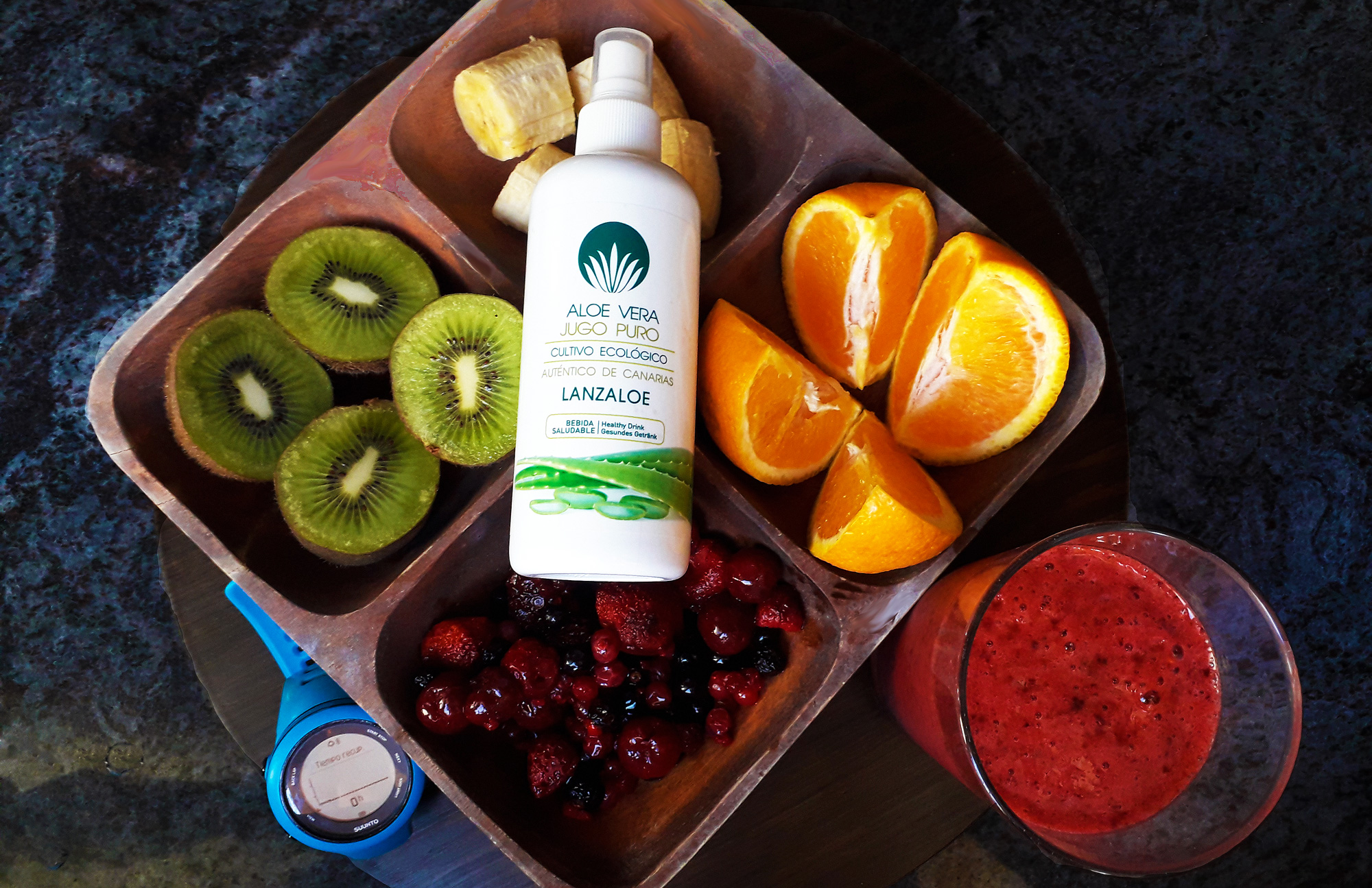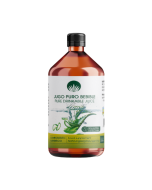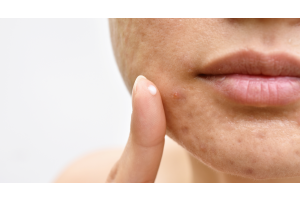Local Storage seems to be disabled in your browser.
For the best experience on our site, be sure to turn on Local Storage in your browser.
Supplements for athletes and Aloe vera

Currently, the results of nutritional surveys conducted with athletes show that, in many cases, their diet is not always fully adequate to their requirements and that on many occasions the choice of food is not the most suitable for the special demands of training or competition.
Added to this is the fact that the usual foods are not always capable of satisfying specific needs that may arise, as we may need for example a concentrated source of energy in small volume, difficult to find in our daily diet, which makes us resort to a supplement designed specifically for this need.
All this makes the statistics also point to athletes as a consumer group of a large number of supplements.
Advantages of supplements:
- Better assimilation: digestive processes and food metabolization are faster in the case of supplements than in natural food, therefore for people with digestive problems, eating disorders or sports events where rapid digestions are necessary, supplements are a great advantage.
- Quick solution: nowadays, eating a healthy, balanced diet, without deficiencies of any nutrient is a challenge. It is very easy that in our daily life we fall into some error; we skip a meal, do not get the necessary calcium intake, we spend with fat, etc.. We can use supplements to supplement our diet and get nutrients quickly.
- Comfort: In our daily life or sports it is difficult for us to continually carry food for each intake. In the work case or under the bike seat there is not much room to wear a taper. One solution is the use of concentrates or energy bars that in certain situations provide us with the necessary nutrients without interrupting our activity.
Difference between Food and Supplements
Foods provide nutrients in varying concentrations while supplements provide nutrients in precise amounts.
Foods provide nutrients indiscriminately while supplements provide nutrients for specific purposes.
Foods contain calories unconsciously and supplements often contain no calories or do so in a controlled manner.
Foods contain nutrients of varying bioavailability and supplements of high bioavailability.
Foods require preparation time while supplements can be used immediately.
They must be eaten in large amounts of food to get a minimum intake of certain nutrients while a small amount of a supplement can get the right amount of certain nutrients.
Why use sports supplements?
Sports supplements are the perfect ally to improve physical capabilities, the first reason is that intense physical activity leads the athlete to maintain a very unstable balance between their energy demands and their income of macro and micronutrients. A high level athlete has a higher nutritional requirement than an inactive person, as there are certain circumstances related to intense physical activity, which can lead to an additional loss of nutrients, such as the loss of minerals with intense sweating.
The second reason for adding supplements to the diet is the great nutritional precariousness of most foods today due to aggressive production methods. This means that foods obtained under these conditions are devoid of nutrients, especially vitamins and minerals. If it is about food of animal origin the thing does not improve, because the massification of the animals in farms does not allow them to grow doing a minimum of physical exercise before being sacrificed and for this reason their meats include a very high percentage of saturated fats, cholesterol and lower concentration of certain ingredients.
The third reason is that many foods are collected before full ripening on the tree or bush and taken directly to warehouses or cold storage where they ripen without the sun which also affects the quality and final quantity of its nutritional content.
The fourth reason is that the vast majority of foods contain preservatives and colorants that are used to extend their life artificially and processing methods are used that nullify or alter certain substances in them. The nutritional supplements suppose an extra and homogeneous contribution of vitamins, minerals, glucides, amino acids and an endless number of beneficial substances with which to enrich and to complement our daily feeding.
What are the recommended nutrients in a food supplement?
- L-Glutamine: helps form lean tissue and prevents loss of muscle mass.
- L-leucine, L-isoleucine, L-valine: these are protective amino acids of the muscle and act as fuel.
- L-Proline: amino acid necessary to form and preserve muscle and connective tissue.
- Magnesium: promotes optimal muscle tone.
- Chromium Picolinate: increases energy level and stabilizes blood sugar.
- Coenzyme Q10: increases tissue oxygenation.
- Vitamin C: increases energy, is antioxidant, repairs tissues.
- Vitamin E + selenium: oxygenates cells and provides energy.
- Creatine: increases muscle mass and physical endurance.
- Glucose polymers: they are complex, energetic carbohydrates.
- Inosine: stimulates the production of ATP, energy at the cellular level.
- L-arginine and L-ornitine: amino acids that release growth hormone, which burns fat and generates muscle tissue.
- L-carnitine: transports fat to muscles, to be oxidized, or used as fuel.
- Omega 3: reduces the blood level of triglycerides and cholesterol.
- Vitamin A + carotenoids: eliminate free radicals produced during exercise.
- B-complex vitamins: increase energy and reduce stress after exercise. They improve the metabolism of carbohydrates and fats.
- Vitamin D: important for calcium absorption.
- Zinc: Relieves stress and fatigue, and repairs tissues.
Aloe vera as a complement:
The Aloe vera juice, once again, demonstrates its versatility and stands out as the best food supplement for those who practice sport at all levels. It contains 75 potentially active components: vitamins, enzymes, minerals, sugars, lignin, saponins, salicylic acids and amino acids.
- Vitamins: contains vitamins A (beta-carotene), C and E, which are antioxidants. It also contains vitamin B12, folic acid and choline. The antioxidant neutralizes free radicals.
- Enzymes: Contains 8 enzymes: aliase, alkaline phosphatase, amylase, bradykinase, carboxypeptidase, catalase, cellulase, lipase, and peroxidase. Some help break down sugars and fats.
- Minerals: Provides calcium, chromium, copper, selenium, magnesium, manganese, potassium, sodium and zinc. They are essential for the proper functioning of various enzyme systems in different metabolic pathways
- Sugars: Provides monosaccharides (glucose and fructose) and polysaccharides: (glucomannan / polmanose).
- Anthraquinones: Provides 12 anthraquinones (including Aloin and Emodin), which are phenolic compounds traditionally known as laxatives.
- Fatty acids: Provides 4 vegetable steroids; cholesterol, campesterol, β-sisosterol and lupeol.
- Hormones: auxins and gibberellins that help in the healing of wounds and have anti-inflammatory action.
- Others: Provides 20 of the 22 required human amino acids and 7 of the 8 essential amino acids.
It also contains salicylic acid which has anti-inflammatory and antibacterial properties.
Lignin, an inert substance, when included in topical preparations, enhances the penetrating effect of the other ingredients on the skin. Saponins, which are soapy substances, form approximately 3% of the gel and have cleansing and antiseptic properties.
You can take two tablespoons of pure Aloe vera juice each morning on an empty stomach or mixed in a natural juice or fruit and/or vegetable shake.
On sports days take two tablespoons after training, you'll notice the difference.


